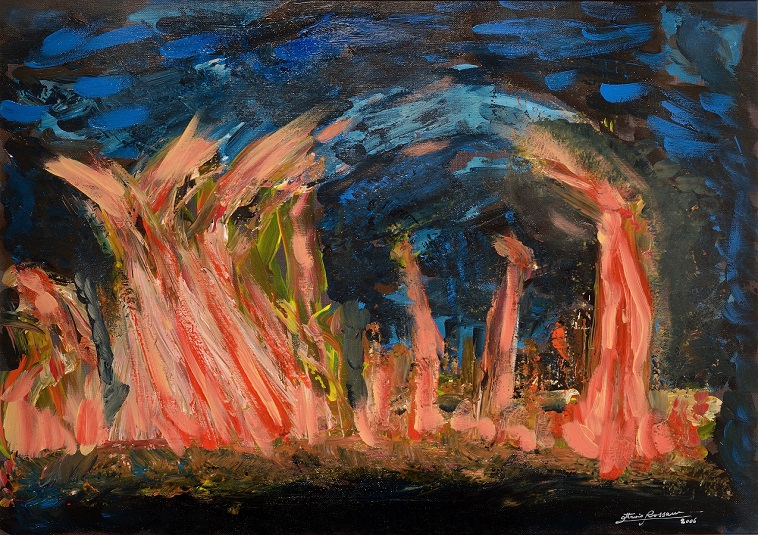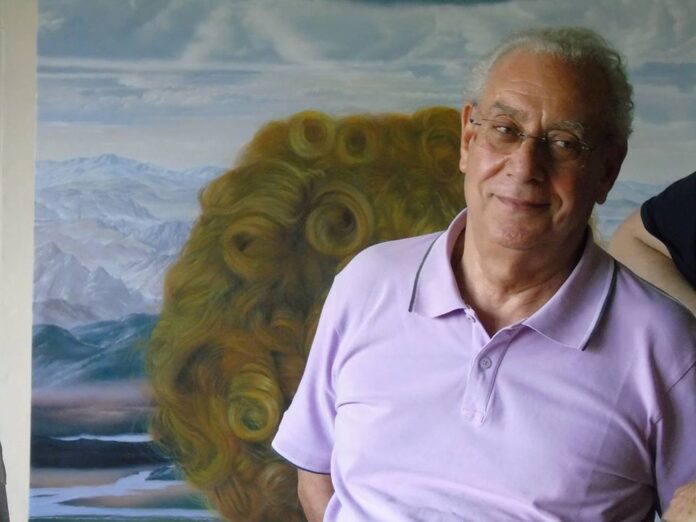We are pleased to offer our readers three of the poems published in the Italian poet’s book titled The Light in the Eyes, 1988-2018, Aragno Publisher, 2019. They have been chosen and translated into English by Carmelo Strano.
OTTAVIO ROSSANI, winner of 2020 Camaiore Prize, was born in Southern Italy, Calabria, in 1944. He is a journalist, poet, painter, and theatre director. He graduated in Political and Social Sciences from the Università Cattolica in Milan where he moved after the high school. After a brief experience as an assistant in Contemporary Literature at the Catholic University, he devoted himself to journalism, working for over 40 years for ‘Corriere della Sera’, as a reporter and then as a special correspondent, mainly in Latin America. From 2007 on he has been the editor of the blog POESIA (poesia.corriere.it) on the Corriere della Sera website.
He is an essayist, novelist, a critic, a painter, and a poet with various collections of his compositions since the early Seventies. In 1995 he published his historical tale Servitore vostro humilissimo et devotissimo. Among his essays: Leonardo Sciascia (1990), L’industria dei sequestri (Longanesi, 1978). The latter essay’s topic, having been faced sistematically, gave way to the study of the sociology of kidnappings in Italy.
With ‘La Luna negli Occhi’ (Aragno, 2019), he got the Camaiore 2020 Award, the only literary event with a popular jury called to evaluate the poetical texts designated by a technical jury. In 1976, he participated in the Viareggio Prize, getting the finalist position, with ‘Le deformazioni’, his first collection of poems.
He wrote the monologue Se mi vengono i brividi that was staged by Edgardo Melchiorri in Buenos Aires in 2000, directed by the author. Director also of Disobbedienza d’amore by Mariella De Santis at the Spazio Sipario Studio (Milan, 1998) and of Se mueren de amor los ramos, a poem by Federico García Lorca on the occasion of the centenary of his birth, with music and flamenco dance (Caffè Letterario, Milan, 1998).
As for an artist, his paintings are featured by fantastic tales with dense rhythm of free color and implicit figuration which sometimes are tied to the relationship between the word and the sign.
Apparition
You Inflamed
like a blaze in the fireplace
shiny
like the Eiffel Tower in the sun
trembling
as a shy female explorer
Apparition
your golden mystery over the whispering
you’re already my euphoria
in the bustle after the conference.
Enchantment
Your smile in that bistro in Paris
Spell
my hot gaze on your face
Vortically
in the unexpected spiral of emotions
plummeting into your perfume
without conditions
Apparizione
Accesa
come fuoco nel camino
lucente
come Tour Eiffel nel sole
trepida
come timida esploratrice
Apparizione
il tuo dorato mistero nel parlottio
sei la mia euforia
nel tramestio dopo la conferenza.
Magia
Il tuo sorriso in quel bistrot di Parigi
Malia
il mio sguardo torrido sul tuo viso
Vorticosamente
nell’imprevista spirale di emozioni
precipitare nel tuo profumo
senza condizioni
Beyond Defenses
Distrusting words
Suspecting pretences.
Reading in your gaze,
I am waiting for you to accept
my invitation.
If you want to invent new days
Put your reasoning apart,
welcome me on your breast.
One night or one life,
fury or silence,
do not betray your heart.
Oltre le difese
Diffidare delle parole
e sospetti una finzione.
Leggendo nel tuo sguardo,
Aspetto che tu accetti
il mio invito.
Se vuoi inventare nuovi giorni
rinuncia al ragionamento,
dammi il benvenuto sul tuo seno.
Una notte o una vita
furia o silenzio,
non tradire il tuo cuore.
Fable
He used to go and see her after dinner
when envious eyes slept.
Words were linking destinies more and more each time.
Shadows of olive trees, complicit gazes,
unexpressed hopes.
Even after her death they kept
gripped in that spell of desire and beauty.
The story was a happy ending
for a very short time only.
Favola
Andava a trovarla dopo cena
quando gli occhi invidiosi dormivano.
Le parole legavano i destini ogni volta di più.
Ombre di ulivi, sguardi complici,
speranze inespresse.
Anche dopo la partenza restarono
avvinti in quel sortilegio di desiderio e bellezza.
La favola fu a lieto fine
solo per un brevissimo tempo.
On the planet of erotic impertinence
by Carmelo Strano
Pervasive. It’s the first adjective that comes to my mind by thinking about Rossani’s poetry. However, it is not clear in the first ones. Of course, you feel tricked, but not on purpose. You’re happy about it, and that’s what matters, regardless of whether the theme is related to sensuality or raw news events. For this second aspect I would refer particularly to the ramming dryness which in the poetic thought is dedicated to Walter Tobagi: The boy counted the steps, the man stared/ the face, the third pointed the gun. / No pain.
The drive is stuck to the dryness of the language and to the construction of the verses. Therefore, the effect is of a delayed-release compression. Here it is the nature of that trap: you have not been hit by an explosion, but you will gradually feel the results anyway.
I point it as a leit motiv of the Milan poet of Calabrian origin. You can also see it in the latest collection of his compositions, The Moon in the Eyes, Nino Aragno Publisher (2019). With this book Rossani won earlier this year the XXXII Camaiore Literary Prize. This book was under the evaluation of the 50 members of the popular jury, which has followed the designation made by the technical jury composed of Michele Brancale, Corrado Calabrò, Emilio Coco, Vincenzo Guarracino, Paola Lucarini, Renato Minore. The jury was chaired by Rosanna Lupi who, in 1981, founded this initiative, together with her husband Francesco Belluomini who died in 2017.
The poems are divided into four sections: Songs, Tales, Recalls, Curtain. They are evocative titles, as tends to happen in Rossani’s poetics and style. Of course, within the sections, each poem has its own title, but so much explicit. On the one hand, evanescence or perhaps avoidance and lightness; on the other hand, visual plasticity (Rossani is also a painter). This dualism establishes an effervescent and vibrant pattern.
As for the Songs, they are obviously far from the canonical verses set by Dante and Petrarca who took them from the Provencal tradition. In any case, Rossani is not an exception to the ever-increasing freedom that poetry has acquired since the beginning of the twentieth century. He takes his freedom all the way to his evocative performances which come into play drily in a basically concrete terrain far from any complacency as well as any “flirtatious” charms. His feeling (feeling and perception) is integral, clear, and total. In fact, his playing around is just weak mops. In Songs, he includes situations that seem more playful, trying to highlight the poetically playful side of situations and circumstances related to the fact. On the other hand, being a scholar, essayist, critic, Rossani knows well the tools and cunning of the craft and knows how to find the appropriate balance between the temptation of poetic and linguistic deviance and the need to communicate. In short, the poet’s caprice is not without limits. And so his message: however shadowed or “open”, is never incomplete, let alone uncatchable.

Very beautiful and interesting the poem Appearance, in this first section. Already in the attack it is seductive: Lit like fire in the fireplace/ shining/ as Eiffel Tower in the sun/ trepidation/ as shy explorer. /Appearance/ your golden mystery in the talk/ you are my euphoria/ in the bustle after the conference. The reader is immediately inside the scene. Lit like fire in the fireplace has a double value: spatial-environmental and metaphorical. She is shining, almost in a tautological way because she is fire and she gives light to herself. The scene moves outside, along with the incandescence. Here is her twin: the famous iron tower emblem of modernity, shrouded in the crackle of the sun that – once again tautologically – makes the protagonist feel a sense of trepidation and even fear (condition emphasized with the image of the shy explorer). The poet said the before and the after. At the heart of this temporality, which recalling futurism, is almost simultaneous, here it is the Apparition. This word is intelligently placed in the center, as an epigraph, and occupies a single verse. The epiphany happens in your golden mystery in the talk. One step ahead (very effective this time jump, a kind of hesitation to put it in terms that kind of waltz), and the picture is complete. The author will not have listened much to that conference given the hurdling images with which he has propped up this poem. The talk and the golden mystery (Gozzano says differently “woman: an endlessly beautiful mystery!”) suddenly become bustle and euphoria. The mood takes over all the emblematic plastic events. The attention immediately shifts from the field of vision to the inner-physical, and the drive explodes.
As it often happens in Rossani’s poetry, there is an interpenetration between space and time, the inside and the outside, the landscape (so to speak, because he never lingers in detail) and the female figure, his deuteragonist, which he does not describe but of which offers flicks of physicality and vitality. In this laboratory, synesthesia plays a great role, so that the poet physically finds his center of gravity in “falling into your perfume / unconditionally“. Elsewhere (in “Spasmo”) he speaks of “ruined hair / by arrogant wind” (this time it is nature that enters the upheaval of the interpenetration). Differently, it can happen that hearing and vision are in cahoots, as in “Orders”, quoting False Borders (1989): “The noises are muffled in the eyes/closed”. In “Flash” the small daily events expand and get bigger as a result of the pervasive passion. In this way Rossani launches his almost Scandinavian “Scream”, in the name of the sympathetic environment, feeling, things. From this semiology of expression, the author moves towards further linguistic conditions. A kind of game between literism and semantics is central in the composition “Words”: “and the verbs become [1](em)brace”.
In the Tales section, the verse bends towards the narrative, the opening-up for a moment is more directly or more explicitly to what is around it. Far from the social themes of Pavese, assumptions and ideologies, the verses of this section loosen the abovementioned interpenetration. They seem to respond to the need for a moment of poetry-prose, as is, precisely, the case of “Working is tiring” of Cesare Pavese. However, we are brought back to that penetration by the Calls: “When the meridian hour comes before the evening/my thought stops on your hand/that moves to the point of delight of your body”. Here the author and his deuteragonist go “on the planet of erotic impertinence”, almost as an ensemble (in “oxygen and the sea”). “That day the rivers melted/on pointed stones prophesized a prophet / the cirrus clouds in heaven spread everywhere/the daring song of the upheaval.
There he is in the mirror, Rossani. In “Dans le miroir,” Sipario section, he looks at himself with circumspection, modesty and shyness until decisive thoughts prevail. In fact, it does not linger in comparison with his image of years ago, even if we are all survivors of some defeat. In any case, the tone of the modulated voice manages to move hidden fibers. A theatre writer and director, he stages himself (he calls himself a “craftsman of myself”) in a “mon coeur mis à nu” manner according to Baudelaire. Finally, he confesses “I climb on the liana of creation/with the force of dreams never forgotten. But above all she, who?, she, the catalyst of multipurpose drives, can do wonders like the woman of the Stilnovo: “if you want, you can take off my mask/ and discover me still lover and loved”.
[1] In Italian the wordplay is made with different words: b(r)aci where baci means kisses and braci means fire.








